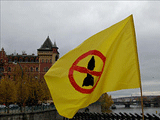Missile defense: From Moscow to Prague
By Jeremy Druker for ISN
Ever since the discussion of basing parts of the shield in the Czech Republic and Poland began, Russia has been threatening various forms of retaliation if the plans come to fruition. And given Moscow's habit of throwing around its hefty energy weight for political purposes, mainly in former Soviet republics - places such as Ukraine, Georgia and Belarus - mere chance seemed unlikely.
The incident immediately followed US Secretary of State Condoleezza Rice's 8 July visit to Prague to initial an agreement to place a radar station in a town 90 kilometers southwest of the capital city - a key part of US plans to build a missile defense shield in Europe against rogue states. Russia's oil pipeline monopoly, Transneft, then cut the flow of crude by about 40 percent, supposedly because of "technical" and "commercial" reasons.
Officials in Russia claimed the move had nothing to do with the ongoing dispute over the shield, and Vladmir Putin himself ordered the supplies back to their previous levels. But even with that intervention, by the end of July, further cuts had translated to a loss of about 50 percent in volume from the month before. Only on 1 August did news agencies report supplies returning to contracted levels.
Russian denials were hard to believe in the context of the current dispute with the Czech Republic. While the country has become a magnet over the past decade for Russian tourists and investment, official relations have never been warm, and have even been frosty as of late, especially over the shield.
The Kremlin is infuriated by the radar plans and the related placement of missile interceptors across the border in Poland, saying the system is aimed at containing Russia and runs counter to Moscow's strategic interests. Efforts to assuage the military establishment and Putin, the long-time president now turned prime minister, have failed.
The same day that Rice signed the agreement, the Russian Foreign Ministry responded with a statement saying that if the Czech parliament ratified the deal, Russia would be "forced to react not with diplomatic, but with military-technical methods." Earlier in the year, Putin suggested Russia might aim missiles at possible missile defense sites and deploy missiles in Kaliningrad, the Russian exclave that borders Poland.
Moscow upped the ante even further earlier this week when Putin said on 4 August that Russia should "restore" its position in Cuba, in comments that followed a high-level Russian trip to the island nation designed to discuss wide-ranging cooperation. Analysts have interpreted the move as an attempt to enter the US "orbit" if Washington continues with plans to expand its military presence in former Soviet satellites.
Without any new polls about the radar base, it's hard to gauge the impact of the latest developments on public opinion in the Czech Republic. After a series of defections to the government's camp by parliamentary deputies since the 2006 elections, the chances that the radar legislation will squeak through parliament are fairly good (according to Czech law, both houses of parliament and the president must approve any deployment of foreign troops on Czech territory).
But political support has not translated into public approval - similar to other foreign policy issues, such as the war in Iraq. Instead, the plans have prompted massive citizen protests, hunger strikes and a petition signed by over 100,000 people.
On one hand, proponents of the base couldn't have asked for more to demonstrate the importance of a closer alliance with the West than the cutoff of Russian oil and Iran's more ominous testing of ballistic missiles on 9-10 July.
The first case indicated how susceptible the Czechs actually are to Russian whims and how in need of concerted western pressure to change Moscow's behavior, while the second showed Iran's belligerence and the real threat even to countries in Central Europe.
On the other hand, opponents of the base could argue what some have been arguing since protests against the radar station began: that it wasn't worth the risk of a) antagonizing Russia and providing Moscow a pretext for flexing its energy muscles; and b) antagonizing Iran and becoming a target once Tehran developed the capability to send missiles as far as Prague.
A publicity stunt by the opposition Social Democrats also probably didn't help the cause of base opponents. While the government and the US Embassy were feting Rice, the Social Democrats were welcoming a Russian general to defend Moscow's position and highlight the party's opposition to the radar plans. That was not the best idea only a few weeks before the 40th anniversary of the Prague Spring, when Warsaw Pact armies violently crushed Czechoslovakia's attempt at "socialism with a human face."
On the lighter side, the Czech online daily aktualne.cz, citing the Russian news agency RIA Novosti, recently reported that an analyst at a top Russian think tank had suggested that Russians hit the Czechs where it would really hurt: beer exports. "If Russians stopped drinking Czech beer in response to the stationing of the US radar base, it would be a much more serious sign, more serious than cutting off oil supplies or than any letter of protest sent by the Russian foreign minister," said Alexander Pikayev, a defense analyst at the Institute of World Economy and International Relations.
The news agency doubted the efficacy of such a boycott, citing data from the Russian Brewers' Union that imports numbered only 1.5-2.0 percent of total beer consumption in Russia. And Czech beer, though growing in popularity, is increasingly being produced in Russia, through licensing agreements rather than being imported.
Still, a beer boycott would be a lot more creative than simply turning off the flow of oil.

